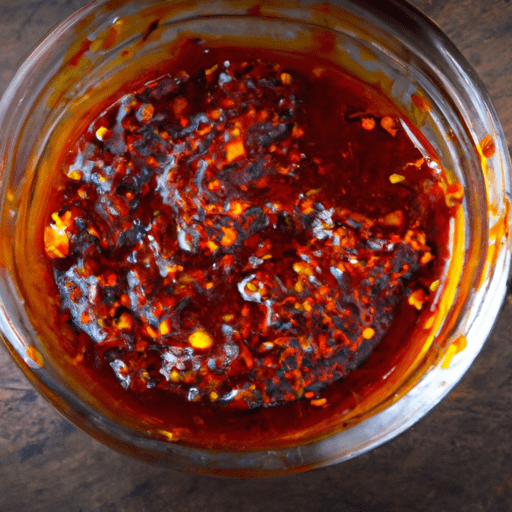The Amazing Korean Marinade: A Burst of Flavor for Your Taste Buds
Have you ever wondered how to take your favorite dishes to the next level? Look no further than the tantalizing world of Korean cuisine and its magnificent marinades. Bursting with bold flavors and an intricate balance of sweet, savory, and spicy, Korean marinades have gained international recognition for their ability to transform ordinary ingredients into culinary masterpieces. In this blog post, we will dive into the fascinating world of Korean marinade, exploring its taste, common uses, nutritional value, and uncovering some interesting history and facts along the way.
Unleashing a Symphony of Flavors
One of the defining characteristics of Korean marinade is its ability to pack a punch of flavors. Often referred to as “jang” or “jeot,” Korean marinades are built upon a foundation of fermented soybean paste called “doenjang” or “ganjang” and fermented seafood paste known as “saewoojeot” or “myeolchi-jeot.” These umami-rich bases provide a deep and savory profile to the marinades.
To balance the savory notes, Korean marinades incorporate sweetness from ingredients like honey, brown sugar, or pear, and acidity through the use of vinegar or citrus juices. The addition of garlic, ginger, green onions, sesame oil, and sometimes chili peppers brings a delightful complexity and a touch of heat. The result? A harmony of flavors that dance on your taste buds.
Versatility in the Kitchen
Korean marinades have found their way into a wide array of dishes, adding depth and complexity to both meat and vegetable-based recipes. Traditionally, the marinades were used to prepare bulgogi, a popular Korean dish featuring thinly sliced beef, and galbi, succulent grilled short ribs. These dishes remain classic examples of the magical combination of Korean marinade and meat, delivering an explosion of flavors with every bite.
However, the uses of Korean marinades extend far beyond grilled meats. They can be used to marinate chicken, pork, or tofu, infusing them with the signature flavors of Korean cuisine. Additionally, marinades can elevate stir-fries, glaze roasted vegetables, or be used as a dipping sauce for dumplings or Korean pancakes. Don’t shy away from experimenting and adding a Korean flair to your favorite recipes!
A Nutritional Powerhouse
Alongside its incredible taste, Korean marinade brings valuable nutritional benefits to the table. Fermented soybean paste, a key ingredient, is rich in protein, vitamins, and minerals. It also contains beneficial probiotics that contribute to gut health. Combining this with the various vegetables and herbs commonly added to the marinade, such as garlic, ginger, and green onions, enhances the overall nutritional value of the dish.
Of course, as with any marinade, it’s important to be mindful of the additional ingredients used, such as sugars and oils. By using quality ingredients and portion control, you can ensure that Korean marinades remain a healthy addition to your culinary repertoire.
A Dip into History
Korean marinades have a rich history rooted in centuries-old culinary traditions. Korean cuisine, known for its focus on fermentation, has deeply influenced the creation of these delectable marinades. Passed down through generations, each family may have its unique twist on the recipe, creating a diverse tapestry of flavors across the country.
It’s fascinating to note that Korean marinades were originally developed as a way to tenderize and preserve meat. With limited refrigeration methods in the past, marinating meat in a mixture of soy sauce, sugar, and fermented pastes helped to extend its shelf life while enhancing the flavor. Over time, the meticulous balance of flavors in Korean marinades became an integral part of the country’s culinary identity.
In Summary
Korean marinades are a true culinary treasure, offering an explosion of flavors that can transform any dish into a memorable experience. Whether you’re grilling, stir-frying, or roasting, the artful combination of savory, sweet, and spicy notes in Korean marinades will undoubtedly take your taste buds on a harmonious journey. So why not embark on a gastronomic adventure and let the Korean marinade enchant your next culinary creation? Your taste buds will thank you!
Korean Marinade
Origin: Korean marinade, also known as “yangnyeom jang,” is a traditional sauce used in Korean cuisine. It is believed to have originated during the Joseon Dynasty (1392-1897) in Korea.
Common Uses: Korean marinade is commonly used to marinate various ingredients, such as beef, chicken, pork, and vegetables. It is particularly popular for marinating meat dishes like bulgogi (grilled marinated beef) and galbi (grilled beef or pork ribs). It can also be used as a dipping sauce or glaze.
Ingredients: Korean marinade typically includes a combination of soy sauce, garlic, ginger, sugar, sesame oil, and other seasonings. These ingredients contribute to its rich umami flavor.
Nutritional Benefits: Korean marinade contains several beneficial ingredients. Soy sauce is a source of amino acids, vitamins, and minerals. Garlic and ginger are known for their potential health benefits, including anti-inflammatory and antioxidant properties.
Unique Properties: Korean marinade is known for its distinct flavor profile, which combines savory, sweet, and umami notes. It has a balanced combination of salty flavors from soy sauce, sweetness from sugar, and aromatic flavors from garlic and ginger. The marinade’s ingredients work together to create a complex and vibrant taste.
Historical Significance: Korean marinade has been used for centuries in Korean cuisine. It is an integral part of traditional Korean barbecue and has played a significant role in Korean culinary history. Its popularity has also spread beyond Korea, gaining recognition as a delicious and versatile marinade worldwide.
Please note that while Korean marinade can add flavor and enhance the taste of various dishes, it is important to consider the overall balance of one’s diet and individual dietary needs.




Use the share button below if you liked it.
It makes me smile, when I see it.